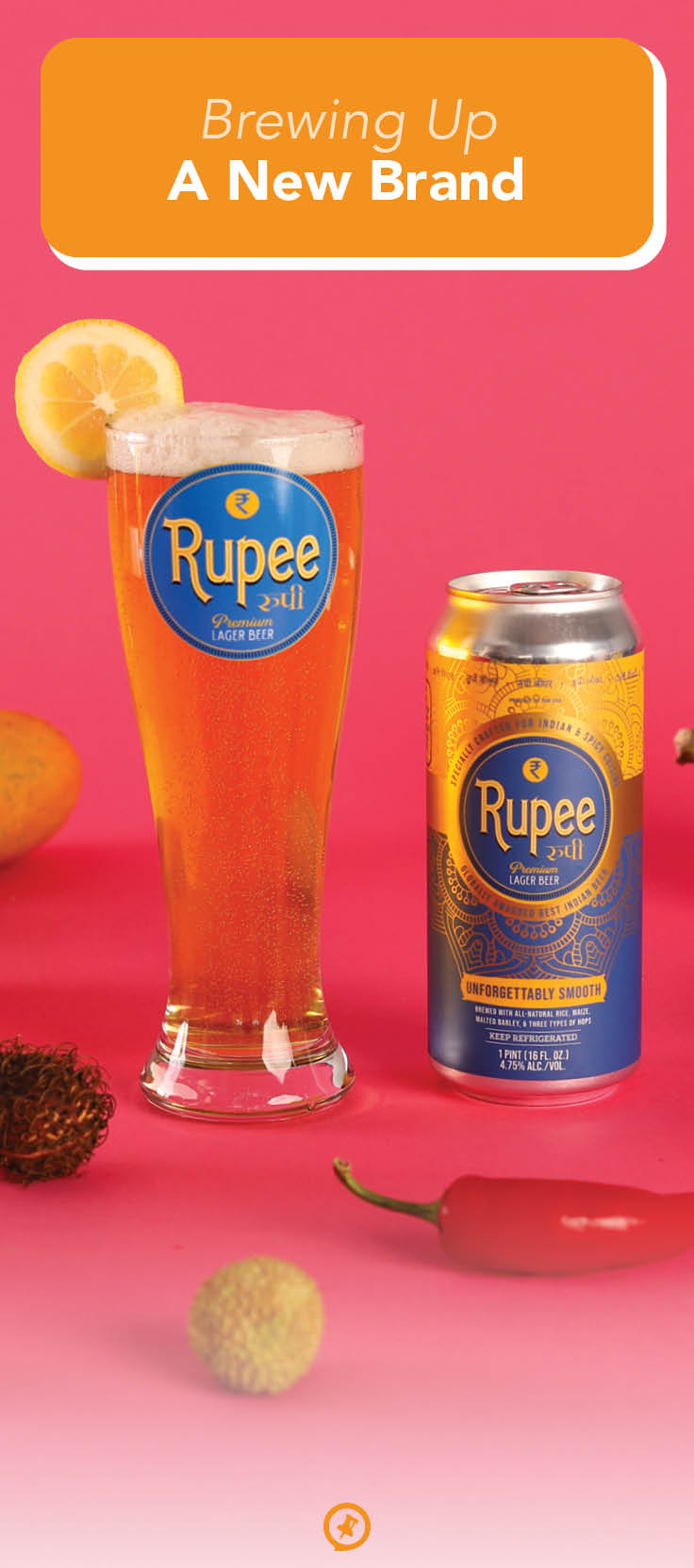Brewing Up a New Brand
Interview with Van Sharma
Photos by Rupee Beer
During the pandemic, brothers Van and Sumit Sharma turned their dream of creating a distinctive Indian beer line into a reality.
Here Van explains why their product, Rupee Beer, stands out in a highly competitive market, what it means to be a fifth-generation entrepreneur, and why their mission is as important as growth.

How did Rupee Beer come about?
In 2020, I was living in London and Sumit was in Australia. When COVID hit, I came back to America while he took one of the last flights back before Australia shut down its borders. We started helping with the family restaurants and soon realized the same problem still existed: Indian beer wasn’t coming to Maine. So we decided to make one here.
The problem was we that didn’t know how to home-brew; we were more interested in the strategy, operations, and distribution side of creating a brand. That’s why we teamed with a British expat named Alan Pugsley, an exceptional brewer in Portland who had been at the forefront of reviving craft beer both regionally and globally.
Alan being English helped tremendously—I always say that what Mexican food is to America, Indian food is to England. Brits have a huge appetite for and knowledge of Indian flavors; chicken tikka masala even became the most popular dish in the United Kingdom at one point. So Alan understood the nuance of crafting a beverage made for Indian food. That fit perfectly with our goal of creating an iconic brand with international appeal that will be around for generations.
Tell us what makes your beer unique:
We spent a lot of time figuring out a recipe that we felt confident putting our names behind. We wanted to solve an inherent beer problem, which is why we worked with Alan to make sure our beer is super light, easy to drink, smooth, refreshing, and crisp—in other words, made especially for complex food profiles like Indian, Thai, Mexican, and Middle Eastern cuisines. Basically, it’s the best beer for global food.
Also, many fancy restaurants have sommeliers, who talk about the wine and recommend types for specific menu items. There’s never been a version of this for the beer category and, more specifically, in the ethnic space. No one’s gone out of their way to say, “This lager will pair exceptionally well with this pad Thai or enchilada.” It always felt like ethnic food was left out of that equation and relegated to a lower level of sophistication, so we want to shake up that arena as well.
What are the biggest business challenges you’ve experienced while trying to disrupt this highly competitive, established industry?
Much of this $800 billion industry is controlled by larger companies that have huge marketing budgets behind their campaigns. It’s a scale game in our industry, liquid to lips. You must be prepared to spend to get your product in front of and in the mouths of as many people as possible. That’s a huge part of the equation, and it’s challenging to keep up with larger, more established players.
Distribution is also a challenge in the beverage world. If you don’t have the right distribution in place, you will experience a lot of pain points on your journey to success. But we’re entrepreneurs. We’re figuring out ways to market Rupee Beer cost-effectively and impactfully by doing everything in-house, and we’re establishing a great distribution network.
Plus, these days, every industry is competitive. I’m in New York right now, and on this block is pizza shop after pizza shop. It’s really hard to do something extremely innovative, but I think we are. At the end of the day, we have essentially created our own category and are at the point where we’re ready to compete with those big brands.

Has this been a slow and steady business success or a fast rise?
It wasn’t even steady at the outset. We started slowly because of COVID; Maine also tends to have less business urgency compared to New York, London, or Sydney. It was hard to get someone to even contract with us—people were probably skeptical of what we were doing. We simply hustled, using our sales and marketing experience to grow as fast as possible. Rupee Beer is now on track to be in fifteen states. I don’t know many craft-beer brands that have been able to grow as fast from inception during an era of so much uncertainty.
In fact, you now see a lot of brands scaling back and pulling operations. We’re going in the opposite direction: expanding distribution, planning for growth, and establishing our brand. We’re also introducing three or four more new SKUs into the market, which is going to be super transformative for Rupee. A lot’s going on; we just don’t stop working. I haven’t taken a vacation in such a long time. [Laughs]
What do five generations of entrepreneurship mean to you and your family?
There’s a great Economist article that explains how for Indians, it’s often considered more of a success to embrace risk and blaze your own trail versus working your way up the corporate ladder. In our culture, entrepreneurship is seen as a very viable opportunity, and family businesses can thrive for generations because of it.
That was certainly true of my family. My grandparents came from a very large and successful agricultural business in North India, yet my dad wanted to do something different, so he moved to Amsterdam. My other grandparents were born and raised in East Africa, which has a huge highly entrepreneurial Indian community as well. So entrepreneurship is very much in our DNA.
In your experience, what’s a notable downside of entrepreneurship?
You have a certain kind of gene being an entrepreneur: one that pushes for “the bigger, the better” and always wants to go for great. I sometimes forget to enjoy the ride because I’m so go-go-go, which I’m trying to work on.
How much is your Indian heritage intertwined with your business’s mission?
A big reason we created Rupee Beer was to help raise the profile of India and clarify the representation of Indians. I love waking up every day and educating people because there’s so much misinformation out there. Many don’t even realize that India overtook China this year as the most populated country in the world or that Indians are the second-largest immigrant group here after Mexicans and are the highest immigrant earners. Also, a prevalent assumption is that people in India don’t drink alcohol—but the country is now the third-largest alcohol market in the world. Drinking is a social thing to do in modern India.
So this definitely isn’t just about craft beer for us; it’s larger than that. We’re also trying to amplify the story of Indian people. I like to call it Beer Diplomacy 101.
In which stores can Rupee Beer Be found?
We’re in select Trader Joe’s, Costco, Whole Foods, and Total Wine locations, and we’re pending at some other national retailers. We’re also in tons of amazing Indian restaurants and chains, some Thai and Mexican restaurants, and local stores.
What’s next for Rupee Beer?
Our latest product is our mango wheat ale. It’s brewed by the founder of Pumpkinhead Ale, which put pumpkin beer on the map thirty years ago. The success of that crop inspired us to bring some nuance to beer with mangoes, the national fruit of India. Growing up, they were always in our house and our family’s restaurants, and they’re incorporated into a lot of Indian cuisine. So this SKU is a nod to that. It’s a great summer beer that’s super light and easy to drink—it’s fruity with a tropical aroma and light tasting notes.
We’re also excited about our Indian pale ale, which is what an Indian pale ale is supposed to taste like: less hoppy and less bitter. Of course, as with everything we do, Indian historical context is woven into these new flavors. Rupee Beer is like culture in a can.
For more info, visit rupeebeer.com


















